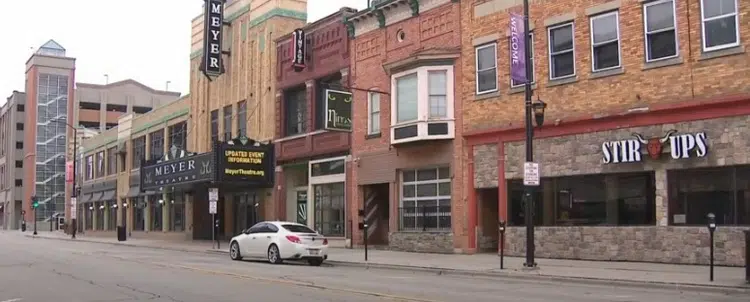MADISON, WI (WTAQ) – As another order forces restaurants across Wisconsin to limit indoor seating to 25-percent capacity, the restaurant industry is looking for solutions…again.
“Restaurants are not gonna be able to survive. And with 25 percent capacity, they’ve been running on fumes for quite a while, so it really is going to be catastrophic for many restaurants,” said Wisconsin Restaurant Association (WRA) President Kristine Hillmer. “It’s really devastating knowing that we’re not going to get federal support and then we have to reduce capacity.”
A survey of WRA’s membership prior to the order showed about 37-percent would not be able to survive another six months without federal dollars. Hillmer estimates that could easily reach 50-percent if the order continues through November 6th.
Some businesses are getting creative with their outdoor seating arrangements as another effort to hold on, but that can only last so long.
“Even though the weather is beautiful today and it looks to be really nice for us this week we know that the cold is coming. In fact, it probably will be starting to come next week,” Hillmer told WTAQ News. “Some restaurants are investing in further tents and patio heaters and so on to extend it as much as possible, but even that is going to be a temporary fix. Because as we know, winters in Wisconsin can be pretty brutal.”
Meanwhile, Hillmer is encouraging people to go out to eat whenever they can. Even if that means sitting in a physically distanced space.
“Go out to eat. It is safe,” Hillmer argued. “We know, in looking nationally as well as with various different health departments in the state of Wisconsin, that the spread is not happening in restaurants…Somebody in their personal life, whether it’s a server or a customer, may go to a birthday party or go to a private party or whatever. They may be exposed and then come into the restaurant, but we are also seeing that because of the safety protocols, it’s not being spread.”
She says those protocols have been well-vetted and implemented by businesses across the state.
“Restaurants have safety protocols in place to keep their staff and their customers safe. This is a necessity for them to do. They know that this is a real virus and there is spread and we certainly want people to be safe,” Hillmer said. “Restaurants have been really working overtime to keep people safe, to amp up all the sanitation procedures, and so on. It really is devastating.”
There are a lot of differing opinions on certain measures, like the true effectiveness of masking and other public health guidelines. But whether someone agrees with an establishment’s rules shouldn’t matter either, Hillmer says. If the operation has put specific safety protocols into place, she asks any patrons to honor those precautions.
“If the restaurant has put together the safety protocols, we ask that they follow them. They do have a choice to not go to the restaurant or go elsewhere, but if an operator has things in place, please honor them,” Hillmer said.
If people are still not comfortable going out and sitting down to eat, then Hillmer recommends curbside pickup or delivery. But her one caveat with delivery – don’t use third-party apps.
“The restaurant should be in the driver’s seat on how their food is delivered. Some of them have re-hired some of their staff in order to get keep them employed and they are doing deliveries,” Hillmer explained.
As for the order itself, WRA doesn’t necessarily disagree about having safety protocols. In fact, they have encouraged members to follow every safety protocol possible and follow the CDC guidelines, including the use of masks. They just aren’t particularly fond of the way the new order is being implemented.
“We would have preferred that enforcement and limits on capacity were best done at the local level and that enforcement and all that happens at that point,” Hillmer said. “Some parts of the state aren’t seeing a lot of spread. So to treat Milwaukee or Green Bay or Madison the same as Wausau, Plover, or Platteville – to me, it doesn’t make a lot of sense.”
The biggest concern, Hillmer says, is the broader economic impact the closure of small businesses could have on the surrounding communities.
“Restaurants are cornerstones of many communities. They’re Main Street businesses. A lot of them are independently owned, they are family-sustaining, and they are the first jobs for a lot of people,” Hillmer explained. “They accept food from farmers, support local charities, and support other local businesses. So when that one restaurant goes out of business, take the ripple effect of that impact to all of those businesses and then multiply that out by many, many, many restaurants. It really is going to be a devastating economic impact on Wisconsin.”



